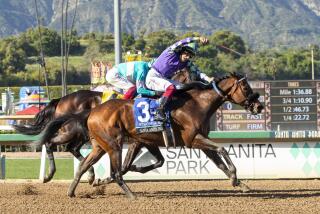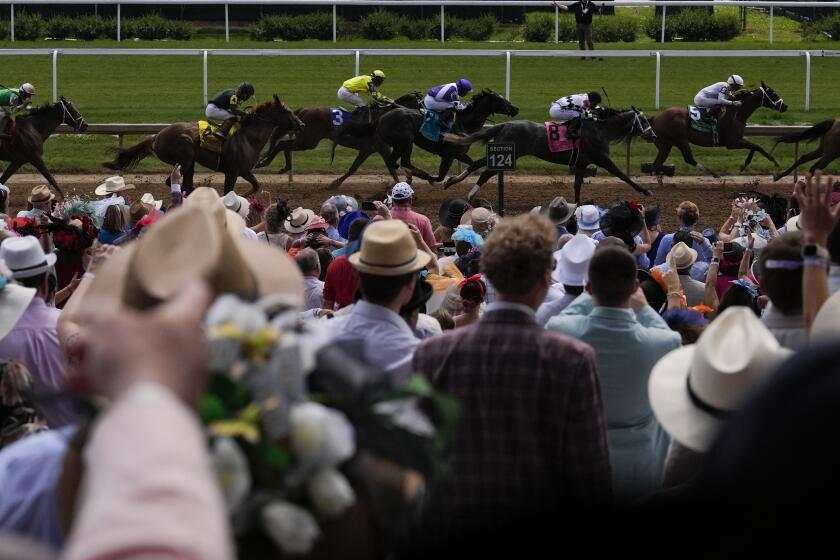Alleged Mismanagement Incites a Jockeys’ Revolt
- Share via
Even for an action-filled sport such as horse racing, it would be hard to top the off-track drama that unfolded on Nov. 15 at the Monrovia headquarters of the Jockeys’ Guild.
Angry jockeys, fed up with their organization’s leadership, concluded a long conference call by firing embattled president L. Wayne Gertmenian and his top deputy, Albert Fiss.
Sometime that day, jockeys allege in a lawsuit, the two men wrote themselves checks totaling $217,000 from the guild’s depleted bank account.
In the afternoon, Gertmenian and Fiss yelled at and shoved a half-dozen jockeys as four state auditors looked on, jockeys said.
“It was ugly. Anything could have happened,” said Darrell Haire, a longtime jockey who is now the guild’s interim national manager.
Added veteran rider Paul Atkinson: “I was in shock. It turned into a big ruckus, with plenty of physical contact.”
Jockeys said the brief altercation ended when they were pushed out of the office and a Monrovia police car arrived in response to a 911 call. There were no arrests or injuries.
But reverberations from Gertmenian’s stormy four-year tenure continue to shake the organization that was founded in 1940 by legendary riders Eddie Arcaro and Johnny Longden, among others, to “promote, protect and serve the welfare and prestige of the professional American jockey.”
Among the developments:
* An initial financial review released Thursday by the guild’s new management alleges “an apparent pattern of increasing fiscal neglect extending for at least the past 18 months.” The report said Gertmenian’s team “inappropriately” used $2.1 million in funds to pay operating costs.
* A House subcommittee has subpoenaed guild records, and the guild says the FBI also is investigating. The California Horse Racing Board has begun an audit of a guild-administered health insurance program.
* Hundreds of jockeys are riding without extended catastrophic accident insurance because a $1-million-per-rider policy lapsed early in Gertmenian’s term.
* Pepperdine, where Gertmenian, 66, is a longtime economics professor, is investigating questions about his resume. In an October hearing, U.S. representatives ridiculed his claim that he worked on U.S.-Soviet relations for the National Security Council during the Nixon and Ford administrations, while another organization told The Times that Gertmenian’s claim that he had served on its board of directors was false.
Gertmenian and Fiss did not return calls to their homes seeking comment. Mitchell Egers, an attorney who is advising Gertmenian, said the former guild executive did nothing irresponsible during his guild tenure.
Egers said a guild lawsuit seeking return of the contested $217,000, filed Nov. 23 in Los Angeles Superior Court, was unwarranted because the checks “were properly drawn.”
In an August letter to U.S. Rep. Edward Whitfield (R-Ky.), Lloyd Ownbey Jr., who was then the guild’s general counsel, dismissed a congressional investigation into jockey healthcare issues as an attempt to “force the ouster of Dr. Gertmenian.”
Guild members had high hopes when Dr. G, as Gertmenian likes to be called, came aboard in 2001. His doctorate of economics from USC and wealth of business experience impressed many jockeys, including Hall of Famer Chris McCarron, who twice won the Kentucky Derby, Preakness and Belmont Stakes.
McCarron and Gertmenian met in 1994. The friendship bloomed about the same time McCarron was losing faith in former jockey John Giovanni, then the guild’s leader. Although Gertmenian had no racing experience, McCarron came to view him as the right man for the job, given his claimed role as a chief detente negotiator in Moscow in the 1970s.
By early 2001, McCarron was helping to orchestrate Giovanni’s departure, and Gertmenian, Fiss and Gertmenian’s Matrix Capital Associates consulting firm took over that summer.
Gertmenian’s last employment contract called for him to be paid $175,000 during 2006. Matrix reported $509,669 in income last year, according to IRS documents posted on a House committee’s website, and Gertmenian testified that most of it came from the guild.
Some jockeys grumbled in 2002 when Gertmenian moved the guild’s headquarters from Kentucky to an office near his Monrovia home. But Gertmenian assuaged doubts with his repeated pledge to improve the riders’ lot -- not an easy task after the stock-market slump and soaring healthcare premiums had weakened guild finances before he arrived.
Men and women who perch precariously atop 1,200-pound thoroughbreds clearly needed the kind of business savvy Gertmenian promised. Affordable medical insurance -- including catastrophic coverage to protect jockeys during races -- has long been an issue for racing.
The death of 16-year-old jockey Josh Radosevich last month after an accident at Beulah Park near Columbus, Ohio, pushed the number of jockey deaths from racing and training accidents to 148 since the guild started to keep records in 1940.
About 6,500 jockeys were injured between 1993 and 1996 alone, according to a study published in the Journal of the American Medical Assn., with nearly a quarter of the injuries involving the head or neck.
Yet jockeys keep at it.
“I’ve broken lots of stuff over the years, but I guess this is the scariest,” said Joe Steiner, 41, of Duarte, who is recovering from a serious neck injury suffered in an April spill at Santa Anita.
Steiner said McCarron’s backing was crucial, calling him “sort of like my idol. He’s also a very intelligent person who researches things very well. He said Dr. G was going to take us and make the guild what it should be, so I backed him 100%.”
Guild membership grew during Gertmenian’s tenure from about 400 to more than 1,200, a notable increase because jockeys aren’t required to belong. Though the guild is a labor organization, some states argue that it cannot organize strikes.
But Gertmenian’s refusal to elaborate on his government work gnawed at longtime rider Jerry Bailey, who told a House panel earlier this year that Gertmenian described the information as confidential.
Miriam Kleiman, a spokeswoman for the National Archives, said last month it “has no records in our files on L. Wayne Gertmenian’s employment with the Nixon administration.”
Ryan LaHurd, president of the New York-based Near East Foundation, told The Times that Gertmenian had never served on the institution’s board of directors, as claimed on the professor’s resume posted on Pepperdine’s website.
Gertmenian was one of a “loose collection of persons” who occasionally acted as advisors but “had no official function,” LaHurd said in an e-mail.
In a statement, Pepperdine said its administrators are “deeply concerned over allegations stemming from Dr. Gertmenian’s involvement with the Jockeys’ Guild,” and have begun an investigation.
But it was the lapsed accident policy that pushed guild politics onto the national stage.
Jockey Gary Birzer had been left paralyzed by a 2004 accident at West Virginia’s Mountaineer Race Track. Birzer was shocked to learn that a $1-million catastrophic accident policy had expired two years earlier.
Absent that policy, injured jockeys in most states were left to make do with $100,000 policies that many tracks buy to cover initial medical expenses after an injury. (In California and a handful of other states -- West Virginia not among them -- riders qualify for worker’s compensation.)
The Birzer incident prompted a panel of the House Energy and Commerce Committee to call an Oct. 18 hearing.
“We are currently living on Social Security, which barely pays our bills,” testified Birzer’s wife, Amy. “Our medical expenses have accumulated to over $500,000, which we cannot begin to pay back. The guild has not done anything further to help us.”
McCarron testified that he had been “stunned” in 2004 to learn that the catastrophic policy had lapsed two years earlier. “Bringing Dr. Gertmenian into the mix was the worst mistake I have ever made,” he said.
Gertmenian testified that jockeys had told him they would choose family coverage over the catastrophic policy if the guild couldn’t afford both. He also said the jockeys had been notified that the policy was lapsing.
Gertmenian and Tomey Jean Swan, then co-chairman of the guild, testified that they were unable to provide minutes of a board meeting during which dropping the policy purportedly was discussed.
The guild chief defended his tenure during the Oct. 18 hearing, saying that he talked to jockeys to better understand their problems and tried to negotiate for better working conditions.
Gertmenian said he met with regulators, track owners and “anyone who would listen. ... We said, ‘Here’s a list of problems. Pick some and let’s get started with the improvements.’ ” But track operators largely ignored the guild’s concerns, he said.
As the hearing wore on, representatives took aim at Gertmenian’s resume, calling his diplomatic work a fabrication.
They questioned payments to Gertmenian’s consulting firm, which employed two of his Sigma Chi fraternity brothers -- attorney Ownbey and chief operating officer Fiss -- and three Pepperdine teaching associates. Gertmenian also drew heat for steering guild funds to Scoop Inc., a consulting firm owned by his daughter Farrell Gertmenian.
After listening to Gertmenian and Fiss, Rep. Marsha Blackburn (R-Tenn.) said she was “beginning to feel like this is part of a Dr. Seuss novel in which we’re talking about events that never happened in a town that doesn’t exist.”
Whitfield, the Kentucky representative, said the circumstances surrounding the lapsed policy appeared to be “a calculated effort to mislead people for personal monetary gain.”
Added Rep. Joe Barton (R-Texas): “It sure looks to me like you got in control of the guild, you put all your cronies on the board, you did everything you can to keep the guild members in the dark about the lack of an insurance policy for on-track injuries until it was obvious that you had to say something.”
With the hearing still fresh in their memory, 27 members of the Jockeys’ Guild Senate met by teleconference on Nov. 15. During the lengthy call, the panel changed the bylaws so they could elect a new board of directors -- which promptly fired Gertmenian.
Haire, the newly elected leader, and a number of jockeys then moved into the guild’s Monrovia office. Within hours, Haire said, Gertmenian and Fiss appeared and demanded that they leave.
Haire said that as he bent over to pick up some papers, Gertmenian pushed him to the floor. Atkinson said Fiss used his size and weight advantage to shove jockeys out of the office: “Albert was charging us like a football player.”
Barry Broad, a Sacramento attorney who represents the guild, said the guild told the FBI and Monrovia police that Gertmenian “took valuable assets,” including Bill Shoemaker’s autographed boot. A Monrovia police spokesman confirmed that the department’s investigation into the Nov. 15 scuffle is continuing.
Gertmenian and Fiss cashed checks totaling about $113,000, according to the guild. But a Superior Court judge issued a temporary restraining order Nov. 23 that ordered Bank of America to stop payment on checks totaling $104,000 made out to Matrix, the consulting firm.
Guild members and the new board say they are going to restore the organization’s finances and reputation.
“We’re going to try and rebuild it,” said Atkinson, a guild member who is not a board or senate member. “We’re going to put it back together. It would be a very sad day for the guys who created this organization ... for us to let it die.”
*
Times staff writer Bill Christine contributed to this report.
More to Read
Go beyond the scoreboard
Get the latest on L.A.'s teams in the daily Sports Report newsletter.
You may occasionally receive promotional content from the Los Angeles Times.










